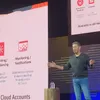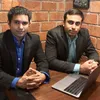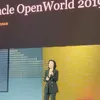At Oracle OpenWorld, startups showcase how they are unleashing the power of blockchain
From meat and mining to shipping and fashion, blockchain is gaining worldwide acceptance across industries. At Oracle’s annual conference, founders reveal how they are using the technology to upend business.
Blockchain is changing the world faster than we know it. PoCs are in place across large companies like Maersk and Walmart, and technology corporates like AWS, Oracle, and Microsoft are battling it out to offer blockchain-as-a-service through their database technology.
At OpenWorld 2019, Oracle presented what startups and mid-sized companies are doing with blockchain. This technology involves a file-based distributed ledger that is immutable and creates transparency whenever there is a transaction by looping in stakeholders responsible for the decisions. This is verified by a host of public servers rewarded by cryptocurrency.

(L-R) Frank Xiong (Oracle) with Lukas Punder (Retraced), Karyl Fowler (Transmute), Douglas Johnson (Circulor), Karl O Connell (Irish Cattle Breeding), and Lionel Louie (CargoSmart) at Oracle OpenWorld 2019.
However, the corporate world is clearly moving to private blockchains because they believe that corporates need to first put their ecosystem in a closed block to bring their entire process and vendors in closed loop blockchain called smart contracts.
Harnessing the power of blockchain
This is already happening with meat manufacturers.
According to Deloitte, the six use cases identified for the technology that can create significant value for the meat industry’s end-to-end supply chain, sustainability, and safety are:
● Grass-fed assurance
● End-to-end traceability
● Trade finance
● Consumer engagement
● Consumer feedback loop
● Certification
Karl O Connell, CIO, Irish Cattle Breeding, said, “Proving traceability of data of beef to show sustainability is key.”
Sustainability means that the animal was not bred on growth hormones and synthetic proteins. Blockchain makes ascertaining this easy as it can help track the feed, the medicine, the cattle's growth, and continue through the production process till the meat reaches the final consumer.
Frank Xiong, Group VP, Blockchain Development, Oracle, said: “At a very high level, blockchain is another way to store data when businesses transact. Blockchain is about inquiring, protecting, and storing data in a transparent way. It is software that uses cryptography."
Tracking refugees and production mistakes
Governments are also turning to blockchain. Some can use the technology to track refugees and ensure that they have been provided care/jobs and a road map to a new life. Others prefer to adopt it for citizen services. For example, in Tunisia, a startup uses blockchain to help the government track and provide healthy daily meals to school kids.
Karyl Fowler, Co-founder of Transmute, a blockchain startup from Austin, said, "At Transmute, we trace physical assets and work with one of the government departments in the US to trace physical assets entering the country from across global borders. You can eliminate all manual processes that performed these tasks so far. Things can be far more automated with blockchain, and enterprises can ensure that they are on top of the IP game."
Blockchain is also being used in the fashion industry to ensure that companies are able to track mistakes in production and catch counterfeits. The packaging and supply chain can be completely tracked from the factory gate to the store.
Lukas Punder, Co-founder of blockchain company Retraced, said, "In fashion supply chains, communications are bad with people using messages, email, or call. Information is lost and no one knows what is going on. We have a chance to streamline communications and ensure policies to make and deliver a great product. Fashion brands don't understand tech, so instead of talking blockchain we tell them about traceability. Of course, the underlying tech will be blockchain.”
In the auto and shipping industries
Blockchain is also being used in the automobile and shipping industries. For example, the automotive industry has thousands of vendors and multiple products coming into the factory gate before the product is assembled.
Douglas Johnson, CEO of Circulor, said, “We track the resource cobalt for the automotive industry with blockchain. Automotive companies need to know if the resource is sourced without the involvement of any child labour. The cobalt is tracked in the supply chain before it is used in the battery manufacturing process. With data protection rights, in Europe, we are currently doing a hybrid of traditional database and distributed ledger technology because most customers can opt out of data being stored."
According to ReportLinker, the global blockchain technology market size is expected to reach $ 57.64 billion by 2025, registering a CAGR of 69.4 percent from 2019 to 2025.
Blockchain works as an electronic transaction-processing and record-keeping system. It allows various participants that are connected to the network, usually public, to track information through a secure network, thereby eliminating the need for any kind of third-party verification.
Blockchain is the future
The market is expected to grow rapidly owing to the numerous benefits that it provides, such as eradication of the requirement of a financial institution to validate transactions, reduce duplicative recordkeeping, eliminate reconciliation, minimise error rates, and facilitate faster settlement.
With the use of this technology, databases could become universal in nature, allowing multiple institutions to use them at the same time to bring different systems closer and help increase efficiency of business.
Lionel Louie, CCO of startup CargoSmart, said: “Blockchain can change shipping too by making the entire ecosystem create policies that are transparent and efficient. Shippers have finally realised there has to be a decentralised system where all stakeholders understand that they are speaking on the same terms when it comes to movement of goods. Terminals, ships, forwarders, truckers, and consignees have to be on the same information page to know what is coming in and going."
With these startups, Oracle knows that blockchain has the potential to upend business. Reason enough for it to bet big on the distributed ledger cloud.
(Edited by Teja Lele Desai)












